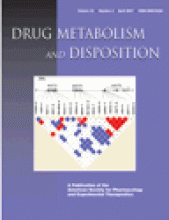Abstract
Genetic variants of three human organic cation transporter genes (hOCTs) were extensively explored in a Korean population. The functional changes of hOCT2 variants were evaluated in vitro, and those genetic polymorphisms of hOCTs were compared among different ethnic populations. From direct DNA sequencing, 7 of 13 coding variants were nonsynonymous single-nucleotide polymorphisms (SNPs), including four variants from hOCT1 (F160L, P283L, P341L, and M408V) and three from hOCT2 (T199I, T201M, and A270S), whereas 6 were synonymous SNPs. The linkage disequilibrium analysis presented for three independent LD blocks for each hOCT gene showed no significant linkage among all three hOCT genes. The transporter activities of MDCK cells that overexpress the hOCT2-T199I, -T201M, and -A270S variants showed significantly decreased uptake of [3H]methyl-4-phenylpyridinium acetate (MPP+) or [14C]tetraethylammonium compared with those cells that overexpress wild-type hOCT2, and the estimated kinetic parameters of these variants for [3H]MPP+ uptake in oocytes showed a 2- to 5-fold increase in Km values and a 10- to 20-fold decrease in Vmax values. The allele frequencies of the five functional variants hOCT1-P283L, -P341L, and hOCT2-T199I, -T201M, and -A270S were 1.3, 17, 0.7, 0.7, and 11%, respectively, in a Korean population; the frequency distributions of these variants were not significantly different from those of Chinese and Vietnamese populations. These findings suggest that genetic variants of hOCTs are not linked among three genes in a Korean population, and several of the hOCT genetic variants cause decreased transport activity in vitro compared with the wild type, although the clinical relevance of these variants remains to be evaluated.
Footnotes
-
This study was supported by the Korea Science and Engineering Foundation (KOSEF) through the National Research Lab. Program funded by the Ministry of Science and Technology (M10300000370-06J0000-37010) and by a grant of the Korea Health 21 R&D Project, Ministry of Health & Welfare, Republic of Korea (A030001).
-
Article, publication date, and citation information can be found at http://dmd.aspetjournals.org.
-
doi:10.1124/dmd.106.013581.
-
ABBREVIATIONS: hOCT, human organic cation transporter; TEA, tetraethylammonium; HPP+, 4-(4-chlorophenyl)-1-[4-(4-fluorophenyl)-4-oxobutyl]pyridinium; MPP+, methyl-4-phenylpyridinium acetate; SNP, single nucleotide polymorphism; DMEM, Dulbecco's modified Eagle's medium; PCR, polymerase chain reaction; MDCK, Madin-Darby canine kidney; LD, linkage disequilibrium; HWE, Hardy-Weinberg equilibrium; MAF, minor allele frequency; UTR, untranslated region; HNF, hepatocyte nuclear factor.
- Received October 27, 2006.
- Accepted January 11, 2007.
- The American Society for Pharmacology and Experimental Therapeutics
DMD articles become freely available 12 months after publication, and remain freely available for 5 years.Non-open access articles that fall outside this five year window are available only to institutional subscribers and current ASPET members, or through the article purchase feature at the bottom of the page.
|






